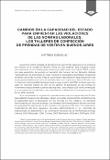| dc.contributor.author | Amengual, Matthew | |
| dc.date.accessioned | 2012-12-05T21:02:31Z | |
| dc.date.available | 2012-12-05T21:02:31Z | |
| dc.date.issued | 2011-07 | |
| dc.identifier.issn | 0046-001X | |
| dc.identifier.uri | http://hdl.handle.net/1721.1/75262 | |
| dc.description.abstract | Developing the capacity for states to enforce labor law is a key challenge to regulating decent work. Dominant accounts of state capacity, however, suggest that the principal components of state enforcement capacity are relative stable and, consequently, difficult to reform in the short-term. This article traces the arc of enforcement in the garment industry of Buenos Aires from 2001-2009. In the beginning of the period, there was little reaction from the state to extreme violations of labor law. Then, in 2006, enforcement increased drastically and was sustained for nearly two years. After 2008, however, enforcement levels dropped once again. Why did the state’s capacity to respond to widespread violations of labor laws in the garment industry change so dramatically over just a few years? In contrast with arguments that focus primarily in the stable organizational features of the bureaucracy, this article shows that a key, and often overlooked, component of capacity is the ability of labor inspectors to mobilize resources from society for enforcement. Since this ability is contingent on the structure of state-society linkages, it tends to be highly unstable and it shifts as political coalitions change. This finding suggests that developing a better understanding of the formation of state-society linkages can lead to new opportunities for regulators to promote decent work, even in places where inspectorates are highly constrained. | en_US |
| dc.description.sponsorship | Spain. National Research Council | en_US |
| dc.description.sponsorship | Andrew W. Mellon Foundation | en_US |
| dc.description.sponsorship | Massachusetts Institute of Technology. Center for International Studies | en_US |
| dc.language.iso | en_US | |
| dc.publisher | Instituto de Desarrollo Económico y Social | en_US |
| dc.relation.isversionof | http://de.ides.org.ar/desarrollo-economico-no-201/ | en_US |
| dc.rights | Article is made available in accordance with the publisher's policy and may be subject to US copyright law. Please refer to the publisher's site for terms of use. | en_US |
| dc.source | Amengual | en_US |
| dc.title | Cambios en la capacidad del Estado para enfrentar las violaciones de las normas laborales: los talleres de confección de prendas de vestir en Buenos Aires | en_US |
| dc.type | Article | en_US |
| dc.identifier.citation | Amengual, Matthew. "Cambios en la capacidad del Estado para enfrentar las violaciones de las normas laborales. Los talleres de confección de prendas de vestir en Buenos Aires."
Desarrollo Económico 51:202-203 (2011). ©2012 Desarrollo Económico. | en_US |
| dc.contributor.department | Sloan School of Management | en_US |
| dc.contributor.approver | Amengual, Matthew | |
| dc.contributor.mitauthor | Amengual, Matthew | |
| dc.relation.journal | Desarrollo Económico | en_US |
| dc.eprint.version | Final published version | en_US |
| dc.type.uri | http://purl.org/eprint/type/JournalArticle | en_US |
| eprint.status | http://purl.org/eprint/status/PeerReviewed | en_US |
| dc.identifier.orcid | https://orcid.org/0000-0001-6024-1920 | |
| mit.license | PUBLISHER_POLICY | en_US |
| mit.metadata.status | Complete | |

